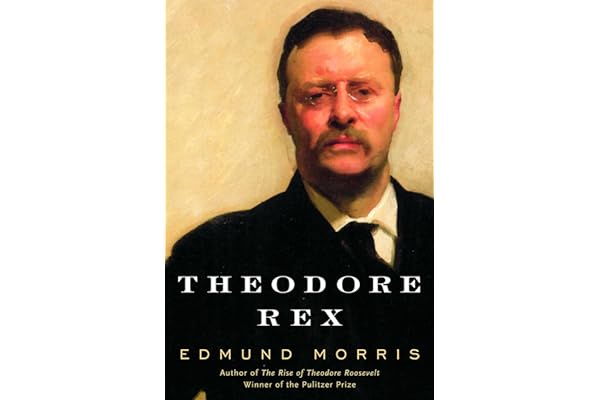One Sentence Summary:
Theodore Rex by Edmund Morris is a comprehensive and captivating biography of Theodore Roosevelt’s presidency, which explores his political achievements, personal struggles, and lasting impact on the United States.
Book Genre:
Biography, Historical Non-Fiction
Main Topic of the Book:
The main topic of the book is Theodore Roosevelt’s presidency, including his foreign and domestic policies, his relationships with other political figures, and his personal life during this time.
Key Ideas:
- Theodore Roosevelt’s presidency was marked by his energetic and progressive leadership style, which aimed to eradicate corruption and improve the lives of American citizens.
- Roosevelt’s foreign policy focused on expanding American influence and protecting its interests globally, through actions such as the Panama Canal construction and the Russo-Japanese War negotiations.
- Despite facing numerous challenges and setbacks, Roosevelt remained determined and highly effective in implementing his policies and achieving his goals.
Main Parts of the Book and a Short Summary:
Part 1: “The Indispensable Man”
The first section of the book covers Roosevelt’s ascent to the presidency, following the assassination of William McKinley. It delves into his early life, military and political career, and his struggles with personal losses. The section also discusses his “Square Deal” policies, which aimed to balance the interests of big businesses, labor unions, and the general public.
Part 2: “Fifty Warlords and the Rhinoceros”
The second section explores Roosevelt’s foreign policy and efforts to establish America as a global superpower. It covers his role in Congress’s passage of the Hepburn Act, which regulated railroad rates, and his attempts to regulate the meatpacking industry through the Pure Food and Drug Act. The section also delves into Roosevelt’s involvement in the Progressive Movement and his conservation efforts to preserve American wilderness.
Part 3: “The Japanese War”
The third section details Roosevelt’s involvement in the Russo-Japanese War, his efforts to mediate peace between the two nations, and his role in securing the Treaty of Portsmouth. It also explores his disputes with Congress over tariff and currency reform and his formation of the Bull Moose Party for the 1912 presidential election.
Part 4: “The Man of the Hour”
The final section covers the last few years of Roosevelt’s presidency, including his attempts to regulate corporate monopolies, his focus on social justice and equal rights, and his proposals for international peace and nuclear disarmament. The section also discusses his decision to not run for another term and his legacy as one of the most influential presidents of the United States.
Key Takeaways:
- Theodore Roosevelt was a dynamic and transformative leader, who left a lasting impact on American politics and society during his presidency.
- He was a strong advocate for progressive policies, such as conservation, trust-busting, and social reform.
- Roosevelt’s foreign policy aimed to assert American influence globally and establish the country as a major player in international affairs.
- Despite facing many challenges and obstacles, Roosevelt remained determined and effective in achieving his goals.
Author’s Background and Qualifications:
Edmund Morris was a renowned biographer and historian, best known for his trilogy on the life of Theodore Roosevelt. Born in Kenya and educated in South Africa and Britain, Morris worked as a journalist and advertising copywriter before becoming a full-time writer. He received numerous awards for his works, including the Pulitzer Prize for his first volume on Roosevelt, “The Rise of Theodore Roosevelt.”
Target Audience:
This book is suitable for anyone interested in American history, politics, and the life of Theodore Roosevelt. It is also a must-read for those seeking to understand the impact of Roosevelt’s presidency and his enduring legacy.
Publisher and First Publication Date:
Theodore Rex was published in 2001 by Random House Publishing Group.

